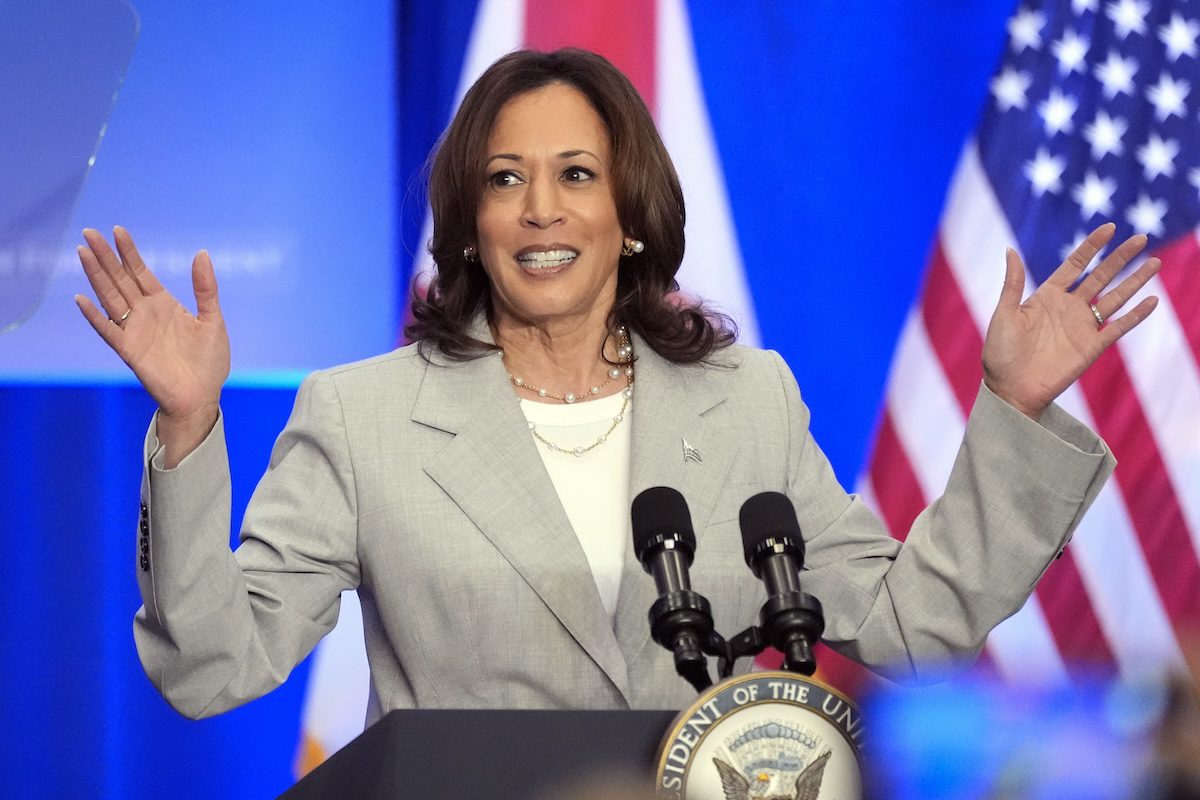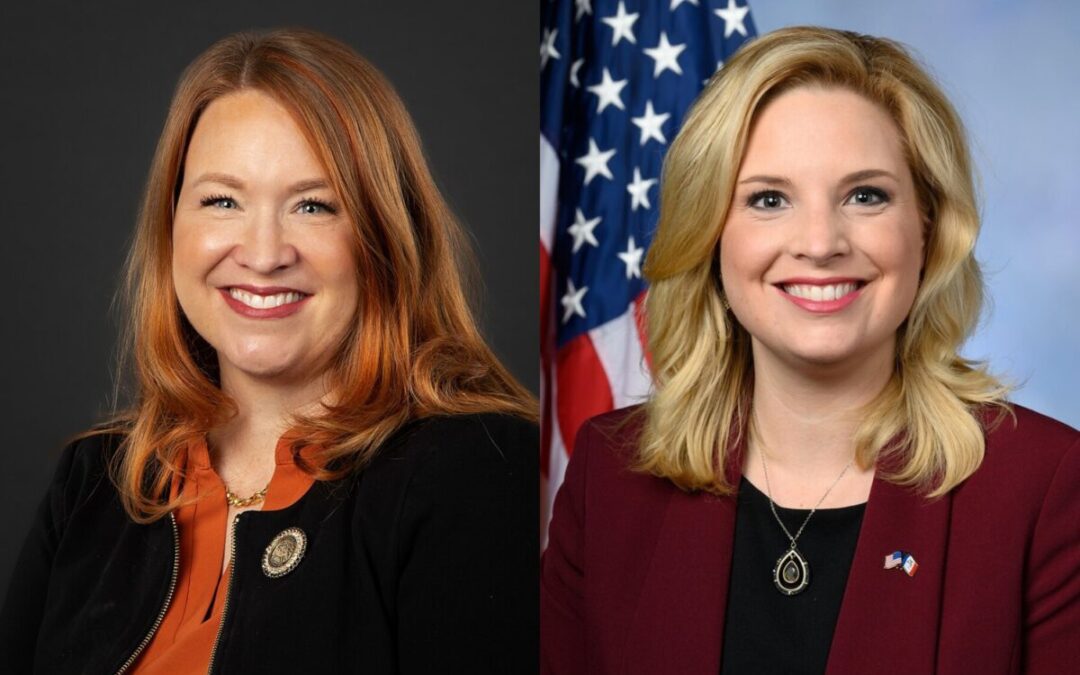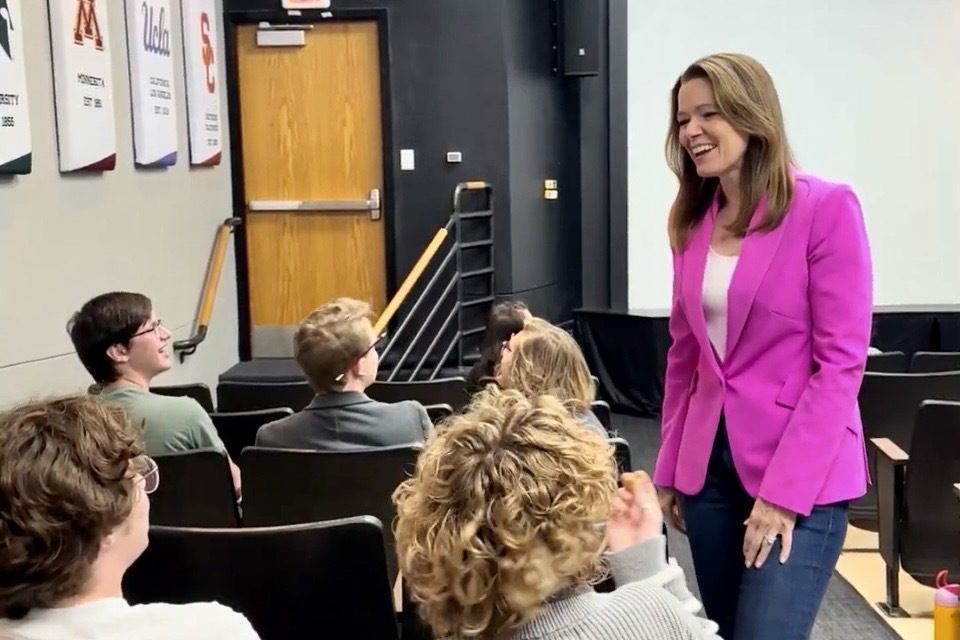
FILE - Vice President Kamala Harris speaks at an event May 1, 2024, in Jacksonville, Fla. She’s already broken barriers, and now Harris could soon become the first Black woman to head a major party's presidential ticket after President Joe Biden’s ended his reelection bid. The 59-year-old Harris was endorsed by Biden on Sunday, July 21, after he stepped aside amid widespread concerns about the viability of his candidacy. (AP Photo/John Raoux, File)
During her time as vice president, Harris has helped pass laws that lowered healthcare costs, invested in childcare and housing, and advanced efforts to fight climate change.
When President Joe Biden and Vice President Kamala Harris took office in January 2021, the country was still struggling with the worst of the Covid-19 pandemic, the national unemployment rate was over 6%, and America had just experienced the worst attack on our democracy with the Jan. 6 insurrection at the US Capitol.
Three and a half years later, the nation, while still facing real issues, has come a long way. More than 15 million jobs have been created under the Biden-Harris administration, the national unemployment rate sits at 4.1%, and the worst of the pandemic-induced inflation has passed.
That record—along with new legislation that has lowered healthcare costs, invested in childcare and housing, and advanced efforts to fight climate change—is likely to serve as a key part of Kamala Harris’ presidential campaign following President Joe Biden’s decision to drop out of this year’s presidential race and endorse Harris.
Harris has also been a strong defender of reproductive rights, traveling across the country over the past two years to highlight the importance of restoring the protections previously offered by Roe v. Wade and of pushing back against extreme abortion bans.
While Harris won’t officially become the party’s nominee until the Democratic National Convention next month, it’s likely she’ll begin touting some of these accomplishments in the coming weeks on the campaign trail.
Here’s a refresher on the major policy items passed since Jan. 2021.
American Rescue Plan
Passed in 2021, the American Rescue Plan Act provided $1,400 stimulus checks to most Americans and expanded the child tax credit for parents, but those temporary policies obscured some of the long-term investments provided by the law.
The American Rescue Plan also provided $40 billion in funds to invest in and create opportunities for America’s workers; provided funding for public safety and crime reduction efforts; funded affordable housing development across the country; provided much-needed financial support to small businesses; invested in health care centers and mental health treatment; expanded food assistance programs to keep American families out of hunger; and expanded child care assistance and invested in schools and child care programs.
Due to the 50-50 tie in the Senate in 2021, Harris, as vice president, was tasked with casting the tie-breaking vote, which she happily did in support of the law.
“The American Rescue Plan provided relief directly to the American people, brought our economy back on track, and helped small businesses boom,” Harris said in a post on X in March of this year. “Three years later, we must build on that momentum and finish the job.”
Bipartisan Infrastructure Law
The Infrastructure Investment and Jobs Act, better known as the Bipartisan Infrastructure Law, was also signed into law in 2021.
The law represented the largest single investment in America’s infrastructure in more than a half-century. The law has upgraded highways, invested in transit systems, improved water systems, funded lead pipe replacement, expanded access to high-speed internet, and more. New projects are breaking ground each day, and the investments have helped fuel a construction and manufacturing boom that’s contributed to the millions of new jobs created over the past nearly three years.
Billions of dollars have been funneled into tens of thousands of specific infrastructure projects across thousands of communities in all 50 states, as well as in Washington DC, in the US territories, and in tribal lands, since the bill’s signing.
Over the years, Harris has touted the bill’s accomplishments.
For example, while speaking at a high school in Virginia in 2022, she emphasized the law’s investments in electric school buses.
And this year, she has repeatedly highlighted the importance of replacing lead water pipes, including during a February visit to Pittsburgh, Pennsylvania.
“For years, parents, grandparents, grandmothers, grandfathers, aunties and uncles, people in the community have been talking about this issue and have been demanding to be seen and be heard,” Harris said, “demanding and saying, ‘look, it does not require a scientist or a doctor to understand the impacts of lead pipes on the health of our children.’ And the voices of the community must be heard.”
White House officials and allies have also credited Harris as a key behind-the-scenes player in the legislation who pushed for several environmental provisions, such as the replacement of lead service lines, funding for electric school buses, and combatting Western wildfires and droughts.
Inflation Reduction Act
Passed in 2022, the Inflation Reduction Act represented the largest-ever investment in fighting climate change, lowered health care and prescription drug costs, raised taxes on corporations, and boosted funding for the Internal Revenue Service to go after wealthy tax cheats.
The bill was passed with only Democratic votes, with every Republican in Congress voting against it, and like with the American Rescue Plan, Harris cast the tie-breaking vote in the Senate, ensuring the Inflation Reduction Act became law.
Since then, companies have announced hundreds of billions of dollars in investments to create hundreds of thousands of new clean energy jobs across the country.
“This work was designed to dramatically expand solar and wind energy production; to lower energy costs for working families; and to put millions of electric vehicles on the road, including thousands of electric school buses so that, of course, our children can have clean air to breathe,” Vice President Kamala Harris said at an Inflation Reduction Act anniversary event last summer.
“And it is with these investments that we are creating millions of good-paying, clean energy jobs; we are rebuilding America’s manufacturing; and we are driving American innovation,” she added.
Bipartisan Safer Communities Act
Also passed in 2022, the Bipartisan Safer Communities Act was the most significant gun violence prevention legislation in nearly 30 years.
The law—which was passed following the devastating school shooting in Uvalde, Texas—enhanced background checks for prospective gun buyers under the age of 21, requiring law enforcement authorities to have time to examine juvenile records, including mental health records for those prospective buyers.
The law also funds community-based violence interruption programs and provides funding to incentivize states to pass “red flag” laws that allow officials to temporarily take away guns from people deemed in court to be a threat to themselves or others.
The law also makes it more difficult for domestic abusers to buy guns by adding anyone convicted of domestic violence to the National Instant Criminal Background Check System.
It also represented the largest-ever national investment in mental health, providing billions in funding for behavioral health care clinics, additional mental health support in schools, additional mental health investments for school-aged youth.
Harris worked closely with President Biden in 2022 to pass the law.
The CHIPS and Science Act
The CHIPS and Science Act, which Biden signed into law in 2022, aims to dramatically increase domestic microchip manufacturing, a move that aims to strengthen supply chains, lower costs for consumers, create jobs for American workers, and make the US more economically independent.
The law allocated billions of dollars to both incentivize companies to construct and expand manufacturing facilities in the US and create workforce development programs and research and development efforts.
The law also invested billions into the Department of Energy, National Science Foundation, and other federal agencies that are focused on technology, innovation, and manufacturing in an effort to make America more competitive with China and other countries.
“I do believe and know America is a nation that is powered by the ambition and the aspiration of her people,” Vice President Kamala Harris said of the importance of implementing the law. “The ambition and aspiration to create, to invent, and build a better future.”
“When we invest in America, we do so because we believe in America,” she added. “We believe in the innovation of our nation. We believe in the greatness of who we are. And we know there is no limit to what our country can achieve. So, we’re going to keep investing in you. And together, we are going to keep working to build a better America.”
Efforts to lower costs, tackle surprise fees, and help workers
Since taking office in 2021, the Biden-Harris administration has also issued several regulations in an effort to crack down on corporate exploitation of workers and consumers, put more money back into families’ pockets, and level the playing field for working- and middle-class Americans.
The administration issued a final rule this year banning noncompete clauses, which effectively bar employees from starting their own business or finding a new job in the same field within a certain area or timeframe after leaving their current job. An estimated 30 million American workers are currently affected by noncompete clauses. The rule is currently the subject of a lawsuit, which could delay or hinder its implementation.
The administration this year also announced a new rule to expand overtime pay for around four million lower-paid salaried employees nationwide. Since July 1, all salaried workers earning under $43,888 who work more than 40 hours per week are now required to receive overtime pay from their employers. Beginning on Jan. 1, 2025, that cutoff will increase to $58,656.
The Biden-Harris administration also announced last year that it would develop federal rules that would bar unpaid medical bills from affecting patients’ credit scores in order to make it easier for Americans with medical debt to get a job, rent an apartment, or secure a car loan, for example.
The administration has also proposed rules to cap most credit card late fees at $8, limit excessive bank overdraft fees, and tackle other surprise and scam fees.
“This is another step in our continued efforts to take on unnecessary junk fees and lower costs for families,” Harris said in a post on X in January, when the bank overdraft fee rule was announced.

Conservative activist Charlie Kirk dies after being shot at Utah college event
OREM, Utah (AP) — Charlie Kirk, a conservative activist and close ally of President Donald Trump, was shot and killed Wednesday at a Utah college...

Dubuque pastor and state Rep. Lindsay James to run against US Rep. Ashley Hinson
Iowa state legislator Lindsay James is the third Democrat to challenge the northeast Iowa congresswoman in a race pitting kitchen-table economics...

Scholten suspends US Senate campaign, endorses Turek
The Democratic primary to take on Republican US Sen. Joni Ernst in 2026 has narrowed. Just one week after announcing his bid, State Rep. Josh Turek...

Paralympic gold medalist Josh Turek launches run against US Sen. Joni Ernst
The Iowa state representative, who won twice in Trump territory, is betting his story of overcoming adversity will resonate statewide. Josh Turek...

Democrat Jackie Norris launches US Senate bid against Joni Ernst
Norris launched her campaign, positioning herself as a problem-solver focused on "invisible burdens" like the mental health and childcare crises...

Iowa constitutional law professor launches third bid against GOP Congresswoman
Christina Bohannan is taking another shot at unseating embattled US Rep. Mariannette Miller-Meeks, after losing by just 799 votes in 2024. Iowa law...




